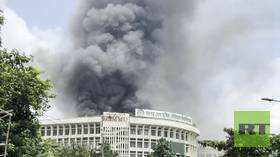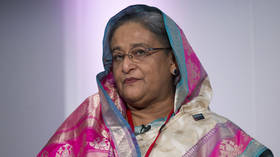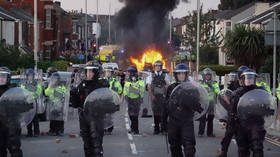The Bangladesh government did not survive the wave of protests and killings. What does the future hold for the country?
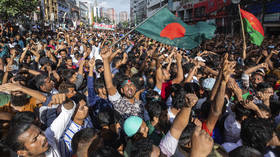
A student-led movement against a quota system which secured government jobs for certain groups gathered momentum after July 16 in Bangladesh, when the then-prime minister Sheikh Hasina described the protesters as the ‘children of Razakars’, a word to describe the reviled volunteers of the Pakistani Army, which committed untold atrocities during the 1971 Liberation War.
The court-mandated quota system for public employment reserved 56% of all jobs for certain categories, including 30% for the family members of those who had participated in the 1971 Liberation War. The student community decried this as political patronage, demanding a merit-based hiring process.
The order issued on June 5 catapulted a major movement against the Sheikh Hasina-led Awami League government, which had been in power for the past 16 years.
While the Supreme Court rejected the lower court’s order, the demonstrations continued and the prime minister lost control of them on August 4. The next day, a mob of nearly half a million, led mainly by students, approached her residence.
Her associates advised her to resign. Initially, she refused and decided to step-up the counter-offensive. The security establishment did not accede to the plan and it facilitated a conversation between the prime minister and her son, Sajeeb Wazed Joy, formerly the chief adviser.
Following his advice, Hasina resigned and left the country with her younger sister Sheikh Rehana on the afternoon of August 5.
In a few hours she landed at an airbase in the city of Ghaziabad near Delhi, where she met Indian National Security Adviser Ajit Doval. Eventually she was taken to an undisclosed location.
Hasina is still in Delhi and according to Sajeeb Wazed, there has been no decision about her plans to leave India.
At least 440 people have been killed in the unrest since July 16, when the movement gained momentum. Eyewitnesses told this correspondent over phone from Dhaka that mainly three categories of citizens were targeted and often killed.
“The government officers who were considered close to the previous dispensation: security personnel, Awami League leaders and supporters, and the Hindu minorities,” said one of the Awami League’s leaders on condition of anonymity. Many residences and Hindu temples have been desecrated and looted.
“…minorities, their businesses and temples, came under attack in multiple locations,” Indian external affairs minister S. Jaishankar told parliament on Tuesday. However, the extent of the damage is not yet clear, he added.
Several Awami League ministers, including the powerful external affairs minister Hasan Mahmud, were detained at the airport before they could fly out of the country.
What next?
Evidently, Bangladesh is in a state of flux. Rumours are spreading faster than facts and several deaths were reported on Tuesday, August 6.
“However, on Tuesday night, it appears that the intensity of the violence somewhat reduced,” said the son of a former Awami League minister.
Officials say the “country is on track” to form the next interim government, led by the economist and Nobel Laureate Mohammad Yunus.
Professor Yunus, whose autobiography ‘Banker to the Poor: Microlending and the Battle Against World Poverty’ hit the bookstores in 1991, is indeed one of the key figures responsible for partly pulling Bangladesh out of acute poverty. Yunus was awarded a Nobel Peace Prize in 2006 for poverty reduction through women’s empowerment.
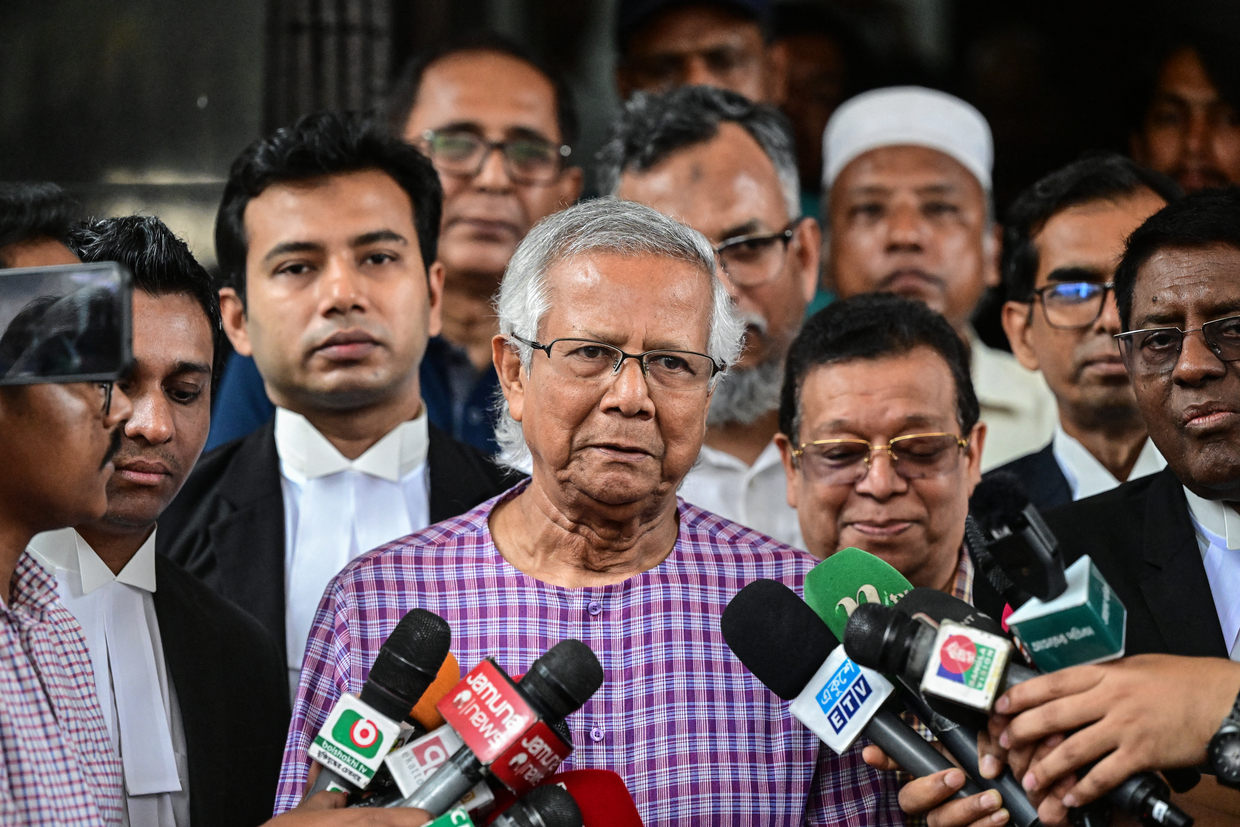
However, Sheikh Hasina’s dislike for Yunus was triggered in 2007 when the economist from the port district of Chittagong announced his plans to form a political party – which could have served as a ‘third front’ in Bangladesh politics challenging the main contenders, the Awami League and BNP-Jamaat. It would have “effectively damaged the secular Awami League in the long-run,” felt the top leadership, and thus Hasina launched her anti-Yunus campaign when she came to power in 2008. A series of investigations were launched against Yunus.
He was eventually removed from his position as the managing director at Gramin Bank, a micro-financing institute he had founded. Over the past 16 years, Mohammad Yunus has faced several legal cases including one in January when he was slapped with a six-month jail sentence for labor code violations.
The 84-year-old economist was acquitted in the case by a labor tribunal in Dhaka on Wednesday, a day before his return to Bangladesh from Paris.
The student leaders proposed that Professor Yunus serve as chief of the interim government, after consulting with him, they said.
The Interim Government
An Interim Government, which is referred to as ‘a caretaker government’, has been assembled three times in the country, in 1996, 2001 and 2006-2008, and has conducted elections.
Bangladesh last witnessed a caretaker government in 2006 when the Bangladesh Nationalist Party (BNP) and its Prime Minister Khaleda Zia’s five-year term came to an end. The government, led by Bangladesh Bank’s governor Fakhruddin Ahmed, successfully conducted one of the country’s fairest elections in 2008, when the Awami League stormed to power.
However, the situation in 2024 is different from 2008.
The interim government’s primary challenge would be to control the law-and-order situation, as at least 150 people (out of 440) were killed between August 4 and 5.
Observers are optimistic that the interim government will be able to control both political and sectarian violence.
Indian Ambassador Sarvajit Chakravarty, who served in Bangladesh, told this correspondent that “the interim government will be able to stop violence with all the stakeholders on board and resume regular government activities in a few days.” The Bangladesh Army has shown restraint and expressed their commitment to the interim government by holding several one-on-one and joint meetings with various stakeholders.
A communique from the office of President Mohammad Sahabuddin, who is playing a pivotal role in forming the interim government, indicated that it has had meetings with key stakeholders, including the main opposition party (BNP), NGO representatives, student leaders, the army, and some of the frontal Islamic outfits. A student leader, Nahid Islam, said that they have handed over a list of probable members of the interim cabinet.
It was not clear if the Awami League was invited to attend the meetings, but League representatives were not present.
The next big challenge for the interim government will be to conduct a free and fair election in the shortest possible period.
All sides, barring the Awami League, will pressure the government to facilitate an early election, in order to reap the benefit from the movement.
“However, it would not be easy for Bangladesh to hold a second national election within a year of the January polls, largely because of its dwindling economy,” said a member of a Dhaka-based business chamber, who requested anonymity.
Economic hardships
The country's post-pandemic recovery has been slow, accentuating unemployment.
“Bangladesh’s post-pandemic recovery faces continued headwinds. Real GDP growth slowed to 5.8% in FY23, down from 7.1% in the previous year” and importantly, growth is projected “to remain relatively subdued at 5.6% in FY24, compared to the average annual growth rate of 6.6% during the decade preceding the COVID-19 pandemic,” the World Bank noted recently.
World Bank data indicates that the number of people living on below $2.15 per day has gone up from 4.9% to 5.1% in the 2024 financial year, owing to slow growth.
Bangladesh’ foreign currency reserves have been steadily falling since 2021 and stand now at $18.4 billion, which is reportedly “just enough” to pay for imports for three and a half months.
Corruption was very high and huge amounts of money were siphoned off from the country.
However, the economic hardships intensified over the last couple of years. According to one estimate, there was nearly $50 billion in ‘illicit financial flow’ between 2009-2015. All this did nothing to alleviate mounting unemployment.
As of 2023, nearly 40% of youth were classified as unemployed and inflation has remained above 7.5% since 2022, after a decade of moderation.
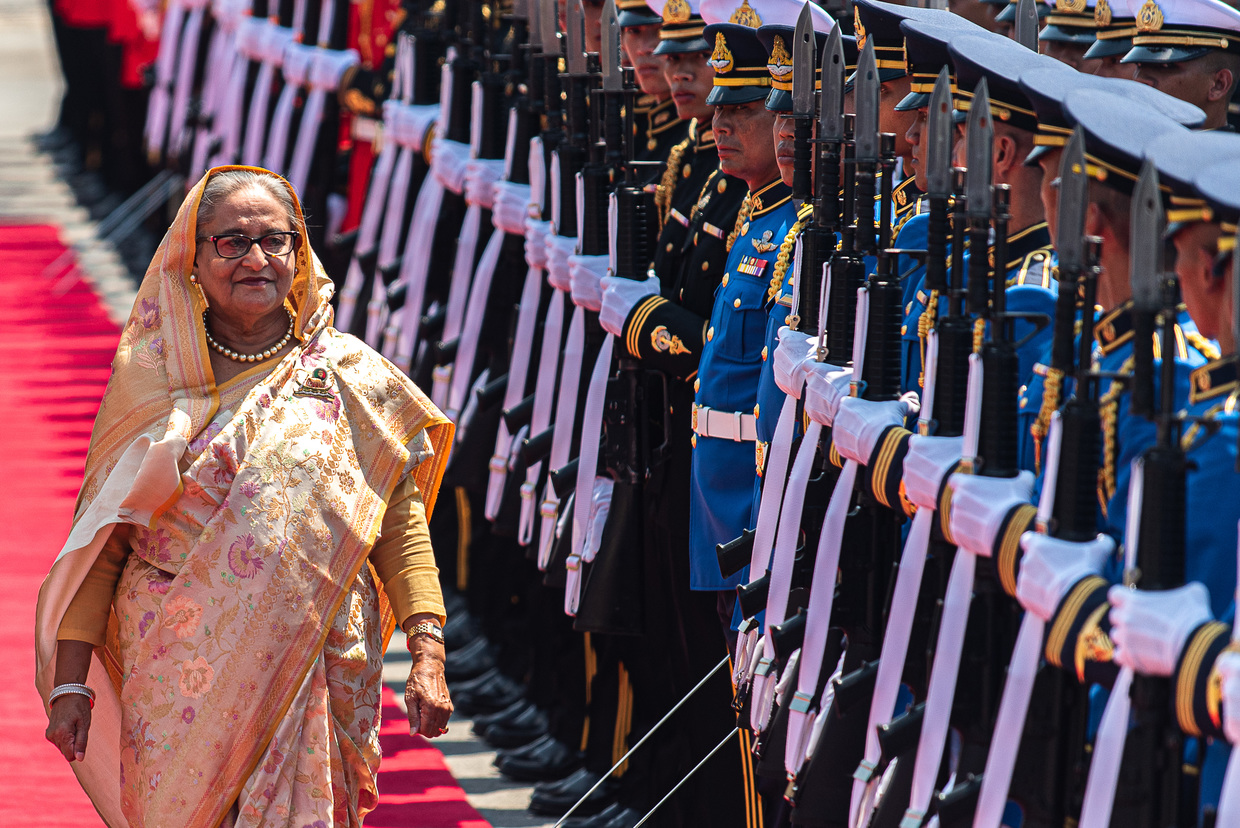
Democratic deficit
The main complaint regarding Hasina, however, is not about her failure to manage the economy, but an overall democratic deficit in Bangladesh.
People’s grievances have accumulated, but they have had limited space to voice them. One of Bangladesh’s popular protest singers Farzana Wahid Sayan said, “if one tries to talk about the discrepancies, discriminations and corruption, the person will be branded as a Razakar, that is - someone who is anti-state, and people cannot accept that indefinitely.”
There is also a widespread belief in the country that due to low turnout and other factors, the last elections were controversial, to put it mildly.
“Hasina was getting isolated in global geopolitics as she was almost entirely dependent on India and conducted three elections which were outright controversial,” noted senior journalist Qadir Kallol.
Covering the 2018 general election in Bangladesh, this correspondent noted: “Eta ektu barabari hoye gesse [this is a bit too much].” Six years later, this is how even Awami League supporters reacted a day after their own party swept 97% of seats in the national Parliament in the general election.
The anti-job reservation movement was the spark required to push the government out of power after a decade and a half of a democratic deficit, compounded by recent economic hardships. People are indeed angry.
As a result, both security personnel and a number of citizens desecrated symbols representing Bangladesh’s victory in 1971. They were even pulling down the giant statues of Sheikh Hasina’s father, the country's founder Mujibur Rahman.
But the anger is “temporary” and Bangladesh will soon roll out of the crisis, believe observers who have been following the country over the years.
“One should not judge Bangladesh on the basis of these visuals when the statue of Mujibur Rahman is desecrated. Bangladesh youth still recognize Mujib as a national icon and a hero and this thought would not change. Just that, it is true that Hasina has played this Liberation War event to death, which has triggered so much anger. Yet the symbols of the 1971 war were replayed, the songs were sung and as this initial sentiment ebbs, Bangladesh will emerge as the winner,” said Sreeradha Datta, professor of international affairs at OP Jindal Global University in India.
Bangladesh has performed “exceedingly well” over the past 16 years in pulling millions out of poverty.
“So, there is no reason to believe that the South Asian powerhouse cannot perform. Countries go through phases of crisis and come out of it. So will Bangladesh,” said Dutta.
The Bangladesh constitution mandates the holding of elections within 90 days once parliament is dissolved. The interim government will have to ensure an election within the time or come up with specific economic, political or security-related reasons to postpone it.
For now, all sides have reached a broad consensus that economist Mohammad Yunus will lead the interim government as the acting prime minister. Bangladesh reached this critical consensus within fewer than 100 hours of Hasina's resignation.
It is not a small achievement, considering the stress the country has gone through in recent years.
